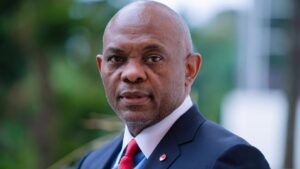
Unauthorised Biography of Godwin Emefiele
On Thursday, February 2, 2023, the Business Editor, Channels TV, Ini John-Mekwa, literally put the National President, Association of Mobile Money and Bank Agents in Nigeria, Mr Victor Olojo, on the spot during a short interview on zoom on the ongoing nagging issue of naira notes swap. The apex bank mandates banks to pay new naira notes . The banks complain of inadequate supply of the new notes. Innocent Nigerians are groaning under the yoke of the ding-dong controversy between the Central Bank and commercial banks.
Responding to a question that POS operators were taking advantage of Naira scarcity to charge those who are desperate to withdraw money huge interest, poor Olojo explained that his members also had to source for naira notes in many places, including filling stations at a cost. One of the biggest headlines in Nigeria on Wednesday , October 26, 2022 was arguably the announcement by the Governor of Central Bank of Nigeria (CBN), Mr Godwin Emefiele that the apex bank would redesign some of the naira notes and make them legal tender before the end of the year. This is a Federal Government project of which the apex bank has the statutory obligation to execute every 5 to 8 years by global standard. But it is believed that in the last 20 years, such a comprehensive re-design has not been done. The rationale for redesigning N200, N500 and N1000 is to help curtail counterfeiting, enhance CBN’s visibility of money supply, promote financial inclusion, boost cashless transaction, reduce the expenditure on cash management, tame inflation and perhaps track some money launderers.
In addition to the new design, the apex bank has announced the limit of cash that an individual or corporate entity can withdraw at the counter and the maximum daily withdrawal at ATMs.
The intent of the Federal Government looks good. But market watchers were quick to finger electricity and network challenges in many parts of Nigeria, especially the rural areas brick walls. They therefore cautioned the government to ensure a more conducive environment before the new policy becomes operational. This position was reinforced by the initial damning reaction of the Minister of Finance, Mrs Zainab Ahmed that, “ We were not consulted. It was the announcement that we heard. But there are also consequences -we are looking at what the consequences will be. There will be some benefits but, there will be some challenges . I don’t know whether the monetary authorities have actually looked very closely at what the consequences are and how they will mitigate it.”
The die is cast.The Oracle has spoken. Nigerians are already contending with the consequences of a good policy erected on hasty implementation procedure. Ironically, by esprit- de-corps, Ahmed is now assisting our embattled Emefiele in the damage control tower to hawk a product that is fast becoming a hard sell. Voices of wisdom, including some national assembly members have passionately appealed for extension of January 31st deadline which they maintained was unrealistic to exit the old naira and assume full swing of the new one. After much grandstanding, Emefiele arrogantly announced that the deadline had been increased by just one week to 10th February and his master, President Buhari assured that within seven days, every Nigerian would have access to the new naira notes.
There are issues. The apex bank is threatening fire and brimstones that commercial banks should start paying the new naira notes. But the banks are secretly crying foul that the new notes are grossly inadequate. In the process , some banks in Ogun State became conduit pipes by hoarding N4 million new naira notes. It is curious how the new naira notes develop wings to parties and money changers.
It is highly stressful to withdraw money from ATM why banks have to ration withdrawals for inadequate cash.
“The transition time from the old to new naira is too short given the required time needed to have the new notes printed and distributed. I suspect the Nigeria minting printing company may not have the capacity to ramp up production as quick as possible hence the delay in the availability of the new notes. The recent developments has caused a disruption in business activities that are cash driven.
Both the old and new notes are not available and Nigerians are paying a minimum of 10 per cent of amount needed to access cash. It’s pathetic and depressing,”said a worried financial analyst. It will not be surprising that the new Naira notes may surface significantly after the general election.
In every adversity, there are opportunities. Operators of POS took over the bank jobs. They charge an average of N2,000 on N10,000 of the old notes as people are desperately in need of cash. The apex bank’s decision that people can still deposit old currency after the new deadline is covered by law but has defeated the objective of tracking money launderers.
Positive impacts of President Buhari’s promise of resolving the scarcity of new Naira notes within seven days is yet to be felt nationwide and time is progressively running out. Economic activities have been bruised. In the process, Emefiele who appears to enjoy controversy in his characteristic military approach has said the new deadline would not be extended. Nigerians are tired of threatened assurances but need action. Top analysts believe that the operational methodology of making the new Naira notes available is flawed. They argued that the apex bank should have released the new notes in tranches to ensure widespread while more N100 note is pumped into the system to supplement the new currencies in the process. This is the prayer of traders.
When Emefiele was appointed the Central Bank Governor by President Goodluck Jonathan on June 4, 2014, everyone was happy that a consummate banker from Ika South Delta State, who is fully armed with strong background in banking and finance has come on board. Upon assumption of duty, the cerebral pioneer staff and former Group Managing Director of Zenith International Bank rattled the financial market by blocking importers of 41 items, including toothpicks from the official forex window since the items could be produced in Nigeria. Due to his stella performance in his first term, President Muhammadu Buhari. joyfully extended his tenure in May 2019 for another 5-year term and the last. Emefiele appears to have become his master’s son and wears a toga of sacred cow in the Buhari’s Administration. If he does not have the backing of the presidency, he could not have announced the decision to print new Naira Notes without input from the Finance Minister. As a further confirmation of his strength in the power equation at Aso Rock Villa, in May last year, the Chief Priest of the apex bank downplayed the bank’s core mandate of promoting and maintaining monetary stability and sound and efficient financial system in Nigeria and validated his rumored presidential ambition on the platform of the ruling All Progressives Congress (APC). Sensing danger and real conflict of interest, INEC disqualified him from contesting at the Primary level. Emefiele did not only dare the public condemnation of his partisanship and massive call for his immediate resignation, but went to the High Court, Abuja with impunity to restrain INEC from disqualifying him. This can only be done by a sacred cow as his principal looked the other way. But the Court refused his prayers to participate in the Primary Election. The landmark judgement is a strong basis for a review of the relevant section in the Central Bank’s Act which is silent on eligibility of a serving governor to run for an election in Nigeria.
We write our history every second. On one hand, Emefiele shall go into the Nigerian version of the Guinness Book of Recordsas the first governor of the Central Bank to serve for two-terms since Nigeria returned to democracy in 1999. On the other, Emefiele is the first serving governor of Central Bank to seek court approval to enable him run for presidential election on the platform of the ruling party. Let us not blame the messenger but the message. It is obvious that the Emefiele is acting the script of his paymasters. The apex bank should not exhibit loss of focus under Emefiele. There are lots of gaps in the management of the Nigerian fiscal and monetary policies. The economy has been working on its head before Russia invaded Ukraine. We cannot continue to blame our economic woes on Covid-19 pandemic. Inflation rate was already double digit before the Covid. Nigerians had been contending with unemployment, low purchasing power and rising poverty before the pandemic. The Nigerian economic outlook for 2023 is gloomy. A global rating agency, Moody’s Investors Service has just dropped our credit rating from B3 to junk bonds. The agency has also stigmatised nine banks, including some tier-ones on creditworthiness. Although the Finance Minister, Ahmed is contesting that the external rating agency did not understand the domestic economy, Nigerians are languishing in pains over exchange rate conundrum, forex scarcity, high cost of living, insecurity and many other physical and spiritual vices. The rating is a call to our economic managers to change their strategy. Where is our Economic Management Team? We should not wait until our economy goes bankrupt like Ghana’s. How does the ebullient Lagos ‘Boy,’ the powerful governor of the Central Bank want history to remember him?
Our problem in Nigeria is not dearth of ideas but implementation. I have not seen a big difference in the manifestoes of the three leading presidential aspirants. They are practically selling the same products — all are pro-market, private-sector -dominant and apostles of removal of political fuel subsidy among others. What can distinguish whoever emerges the president after the election from the status quo and free Nigerians from the current land of Egypt is the implementation strategy.



